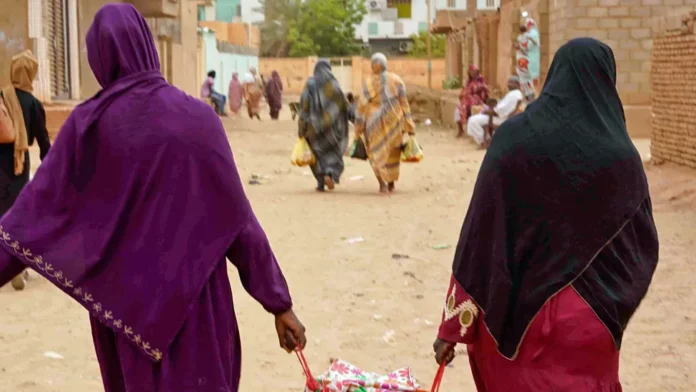
The voice of the female doctor in war-hit Sudan is shaky. She is leaving a message with BBC Arabic’s mobile phone number via WhatsApp.
It is for a special radio programme called Li Sudan Salam, which means both “greetings to Sudan” and “peace to Sudan”.
It was launched following the outbreak of conflict there between the army and the paramilitary Rapid Support Forces (RSF) on 15 April.
Hundreds of people have died and more than a million have been forced from their homes across the country.
The radio programme has received numerous messages about women and girls being raped amid the insecurity.
It is difficult to establish the exact number of victims, but doctors fear many cases are going unreported.
“We have been able to talk to three women who have been raped and we are trying to provide treatment for them, but there are two women we haven’t been able to reach yet,” says the doctor at one of the few hospitals still operating in Bahri, one of three cities that make up Greater Khartoum – Sudan’s capital.
“We couldn’t sit there and do nothing. We are trying to refer these cases to the obstetrics department for examination, but our problem in Bahri is that it is hard to get medicine.”
Salima Is’haq, the director of a government unit to combat violence against women in Sudan, says most cases of rape are reported in Bahri, which has seen some of the worst fighting.
“The age of the girls who come to us range from 12 to 18 years,” she says, her voice full of despair.
“But the cases we have reached are much lower than the actual number. They may constitute only 2% of what is happening.”
With much of the government in a state of collapse, Ms Is’haq does what she can.
She co-ordinates the supply of health and psychological support to victims through a network of charities and volunteers, but many survivors want no contact.
“The conditions are currently difficult in Khartoum; everything is chaotic. Now we are trying to focus the awareness campaign on how to report cases of assault and get help,” she says.
It is an attempt at accountability and justice in a time of war.
Meanwhile, the internet is frequently down and there are constant power cuts.
In Khartoum, only six out of 88 hospitals are operational.
Many messages received by the radio programme highlight the tragedy of patients suffering from kidney disease who need regular dialysis but are unable to access treatment.
“The medication is almost non-existent now. I couldn’t get it for my sick brother,” says Najlaa.
“Fortunately, I met someone with the same condition at the pharmacy, and he gave me some of his medication. We need help from any source to provide essential treatment.”
And for daily labourers who live hand to mouth, it is just as bad.
“We used to manage with some money, but not anymore. There are no job opportunities. I have children, and my mother and siblings also live with me. I have spent all my savings,” says Mubarak.
He says his neighbours have shared what little food they have but it is getting more difficult every day.
Despite the trauma, this sense of solidarity at the worst of times is inspiring the team who work on the radio programme.
“Their trust in BBC Arabic radio is something which has touched me,” says Mays Baqi, one of the programme’s producers. “Despite the difficulty in communicating, many Sudanese share details about their lives because they trust that we will listen and tell their stories honestly.”
Source: BBC



